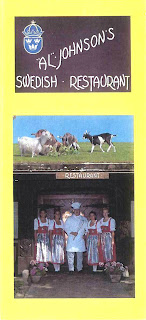Precedential No. 4: TTAB Dismisses "Goats on a Roof" Cancellation Petition for Lack of Standing, Failure to State a Claim
In one of the more bizarre TTAB cases in years, the Board granted Respondent's motion to dismiss a petition for cancellation of two registrations for the mark shown below (comprising goats on a grass roof) for restaurant services and retail store services. Petitioner Robert Doyle failed to allege sufficient facts that would establish his standing, and failed to state a claim on which relief can be granted. Robert Doyle v. Al Johnson’s Swedish Restaurant & Butik, Inc., 101 USPQ2d 1780 (TTAB 2012) [precedential].

Standing: Doyle alleged that he personally has been or will be negatively affected by Respondent's registrations because:
Many establishments in the classes to which Registrant’s mark apply have, because of Registrant’s marks, refrained from placing goats on their grass roofs, as a result of which Petitioner has been, and will continued (sic) to be, damaged in that Petitioner has been, and will continue to be, unable to satisfy his desire to take photographs of goats on grass roofs.
Even though, as we know, the standing hurdle is quite low, Doyle failed to clear it. Although he may have a "real interest" or a "personal stake" in taking photographs of goats on a roof, Doyle did not "relate [his] alleged impairment to respondent's service mark in any manner." There was no allegation that Respondent's mark somehow prevented him from placing goats on a grass roof and photographing them, or even photographing the goats on Respondent's restaurants.
Moreover, Doyle's alleged belief that he will be damaged was not reasonable. Respondent's mark does not prevent his photographing goats on grass roofs. Doyle did not allege that he uses or wants to use goat photographs in connection with restaurant or retail store services. In short, he failed to allege a reasonable basis in fact to support his claim of standing.

Functionality: Doyle's alleged ground for cancellation was functionality, but he failed to relate this claim to respondent's services. In other words, he failed to allege that goats on sod roofs are essential to the use or purpose of restaurant or retail store services.
Doyle asserted that goats and sod roofs affect respondent's costs by reducing respondent's energy and mowing expenses, but that allegation was completely unrelated to respondent's services. Goats on a sod roof might decrease the costs for any business, but functionality must be assessed in connection with the specific services at issue.
Doyle also alleged that the mark was functional because it is a "form of entertainment" that attracts customers. However, although goats on the roof may attract customers to respondent's restaurant, there was no allegation that this method is superior to any other method for attracting customers. Moreover, the Board observed, there is "no prohibition against a trade dress mark both functioning to indicate source and being aesthetically pleasing."
And so the Board concluded that Doyle's allegations, even if true, cannot establish the functionality of the registered mark.
The Board allowed Doyle 20 days to file an amended petition sufficiently alleging standing and a proper claim of functionality. However, it cautioned Doyle to be aware of the "extreme difficulties he would likely face in ultimately proving that respondent's mark is functional."
TTABlog comment: What gets my goat is that the Board can't award monetary sanctions against a plaintiff who brings such a ridiculous claim.
Text Copyright John L. Welch 2012.




7 Comments:
What gets my goat is that bad claims make hasty, thoughtless law. It can't possibly be the case that a feature that decreases the cost or increases the quality of multiple products/services is therefore nonfunctional or unrelated to any one of those services. Consider: I say a protectable element of my trade dress is that I use a computer, rather than a hand calculator, to ring consumers up. (Assume we're at a period where this is not yet widespread.) The fact that lots of businesses selling very different things could reduce costs by doing the same thing enhances functionality. There may be reasons to reject this claim, but the reason given is terrible!
I have had it with these m$#%^*#@+>g goats on this m$#%^*#@+>g roof!
This was a sufficiently bizarre case that I did a quick Google search on Plaintiff's counsel - seems he has a habit of frivolous pleadings: http://cityroom.blogs.nytimes.com/2011/06/17/court-dismisses-lawyers-appeal-to-wear-baseball-cap-in-court/.
Hmmm.... Did they tell him to butt out?
I had a goat when I was kid -- really I did. I grew up on an island in the caribbean. The thing about goats, you would have to attach them to a leash to keep them on the roof and then they would hang themselves trying to get off the roof.
I love this case with every fiber of my being! I love that there are actual goats eating actual grass above actual patrons eating Swedish-meatballs and pickled herring. I love that the standing argument made me laugh HARD after a tough day. I think they reached the right decision on the law - it's simply too speculative to conclude that the organic roof decreases the cost or increases the quality of the restaurant's services - perhaps the TTAB could have rocked our world and invoked the aesthetic functionality insanity?
It has been three years since I first read this post. It still makes me laugh. I consider it the greatest (Civil) Law blog post ever. I'm surprised the ABA didn't give you an award for this....or a free meal at Al's.
Post a Comment
<< Home